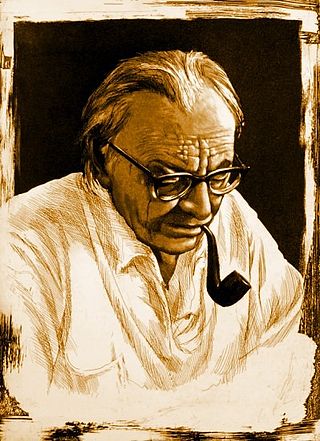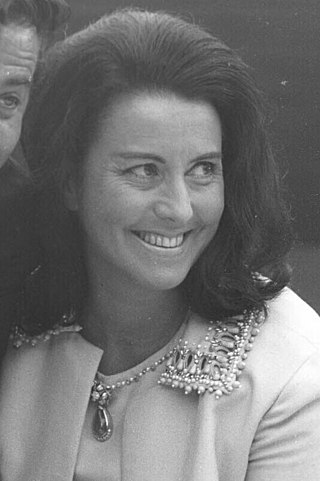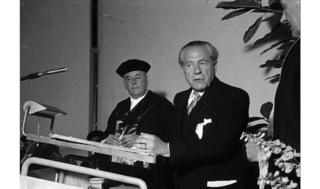
Antigonae (Antigone), written by Carl Orff, was first presented on 9 August 1949 under the direction of Ferenc Fricsay in the Felsenreitschule, Salzburg, Austria, as part of the Salzburg Festival. Antigonae is in Orff's words a "musical setting" for the Greek tragedy of the same name by Sophocles. However, it functions as an opera.
Kurt Böhme was a German bass.
Werner Egk, born Werner Joseph Mayer, was a German composer.

Inge Borkh was a German operatic dramatic soprano. She was first based in Switzerland, where she received international attention when she appeared in the first performance in German of Menotti's The Consul, in Basel, in 1951. In 1952, Borkh became a member of the Deutsche Oper Berlin and the Bavarian State Opera in Munich. She appeared at leading opera houses in Europe and the Americas, and at festivals such as Bayreuth and Salzburg. Trained first as an actress, she was admired for both singing and stage presence, especially in the Richard Strauss roles Salome and Elektra. She also performed in contemporary opera, such as the premiere of Josef Tal's Ashmedai at the Hamburg State Opera in 1971. Her recordings include complete operas and recitals. Borkh was awarded the Hans-Reinhart-Ring, the highest honour for theatre professionals in Switzerland.
Anna Tomowa-Sintow is a Bulgarian soprano who has sung to great acclaim in all the major opera houses around the world in a repertoire that includes Mozart, Rossini, Verdi, Puccini, Heinrich Marschner,Wagner, and Strauss. She enjoyed a particularly close professional relationship with conductor Herbert von Karajan from 1973 until his death in 1989.
The Countess Cathleen is a verse drama by William Butler Yeats in blank verse. It was dedicated to Maud Gonne, the object of his affections for many years.
Literaturoper, a term coined by the German music critic Edgar Istel, describes a genre of opera that emerged during the late 19th century. When an existing play for the legitimate theatre is set to music without major changes and without the intervention of a librettist, a “Literaturoper” is the result. Although the term is German, it can be applied to any kind of opera, irrespective of style or language.

Lisa Della Casa was a Swiss soprano most admired for her interpretations of major heroines in operas by Wolfgang Amadeus Mozart and Richard Strauss, and of German lieder. She was also described as “the most beautiful woman on the operatic stage”.
Maria Litto (1919–1996) was a German ballet dancer, choreographer and film actress. In 1970, she pioneered dance programming on German television.
Kari Løvaas is a Norwegian operatic soprano who made an international career outside Scandinavia, mostly using the German spelling of her name, Kari Lövaas. She has performed at international festivals such as the Salzburg Festival and the Lucerne Festival in both opera and concert. She participated in complete recordings of rarely performed operas, including works by Haydn and composers of the 20th century, has recorded Lieder and has regularly appeared in choral concerts.
Die Zaubergeige is a 1935 opera by Werner Egk to a libretto by Ludwig Strecker after Count Franz Pocci. Egk revised the opera in 1954.
Die Verlobung in San Domingo is a 1960 opera by Werner Egk after Heinrich von Kleist, premiered on 22 November 1963 at the Bavarian State Opera.
Columbus is a 1933 opera by Werner Egk. Originally a radio opera, Egk revised it in 1942 for the stage. The Munich premiere was acclaimed in the press and joined the year's repertoire at the Freiburg Theatre, though some dissented. The lack of melody in the opera brought negative comment from Richard Strauss in comparison to Meyerbeer's grand opera on the life of the Portuguese explorer Vasco da Gama L'Africaine.
Peer Gynt is a 1938 opera by Werner Egk to a libretto after the play Peer Gynt by Henrik Ibsen. The premiere took place on 24 November 1938 at the Berliner Staatsoper where Egk was the conductor at the time.
Circe is a 1945 opera by Werner Egk after Pedro Calderón de la Barca, premiered 1948. Egk reworked it as an opera semibuffa as 17 Tage und 4 Minuten, 1966.
Margarethe Bence was an American opera singer, who sang both mezzo-soprano and contralto parts and was mostly active in German and Austria, including international festivals such as the Bayreuth Festival and the Salzburg Festival. Her repertoire included music from Baroque to contemporary premieres.

Oskar Czerwenka was an Austrian operatic bass and academic teacher. He was a member of the Vienna State Opera from 1951 to 1986, performing 75 roles, including his signature role Ochs auf Lerchenau and premieres of new operas. He was also an author, visual artist and illustrator, and performed in concert. He received several awards, and the state music school in his home town was named after him.
Lilian Benningsen was an Austrian operatic mezzo-soprano and contralto. She made an international career based at the Bavarian State Opera for decades, where she first appeared as Eboli in Verdi's Don Carlos. She created several roles, such as Carolina in Henze's Elegie für junge Liebende at the 1961 Schwetzingen Festival. Her recordings include both operas and concerts.

Ludwig Strecker Jr., also Ludwig Strecker der Jüngere, was a German music publisher, and an author of opera librettos which he wrote under the pen name Ludwig Andersen. He authored, and published through the Schott publishing house, two of the most successful German contemporary operas of the 1930s, Egk's Die Zaubergeige and Reutter's Doktor Johannes Faust.
Rosl Zapf was an Austrian operatic mezzo-soprano. She was a member of the Oper Frankfurt from 1950 to 1976, where she appeared in leading roles such as Herodias in Salome. She took part in world premieres such as Luise Talma's Die Alkestiade and Uno sguardo dal ponte by Renzo Rossellini. She performed at leading opera houses internationally, including La Monnaie in Brussels, Teatro Nacional de São Carlos in Lisbon and the Paris Opéra.





